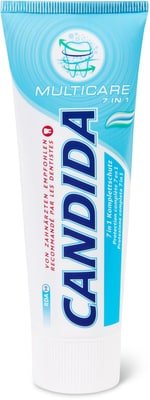If you're browsing the toothpaste aisle of your local grocery store, would you do a double-take upon seeing this prominently displayed?
That's what happened to me several years ago when shopping in Switzerland. To this day I smile whenever I see it on a visit to Migros or Coop. It is a prime example of the need for companies to take care when exporting their products to other countries. Perhaps the best-known example is selling the Chevy Nova in Spanish-speaking countries: General Motors certainly didn't want prospective buyers to be thinking "doesn't go" with respect to their cars.
If the Swiss company that makes Candida toothpaste exports their product to English-speaking countries, I doubt it is under the same name. The thought of brushing my teeth with something that suggests a vaginal yeast infection does not inspire me to put this in my shopping cart. It is not much better to be reminded of thrush, a candida infection of the mouth.
I don't know what the makers of Candida were thinking when they chose that name, but it turns out that it's not as crazy as it sounds. Although this toothpaste appears to me to be marketed simply as a good dentifrice, there have been studies showing that certain toothpastes are effective in fighting oral candida infections. Here's a study that compared nine brands of herbal and conventional toothpaste (unfortunately, Candida was not among them) and concluded,
All toothpastes studied in our experiments were effective in inhibiting the growth of all C. albicans isolates. The highest anticandidal activity was obtained from toothpaste that containing both herbal extracts and sodium fluoride as active ingredients, while the lowest activity was obtained from toothpaste containing sodium monofluorophosphate as an active ingredient.
Now you know. Maybe the Swiss are onto something.



